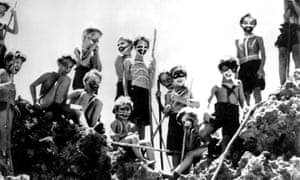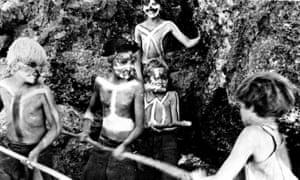Reblogged from The Guardian

Last modified on Wed 13 May 2020 16.08 BST
When a group of schoolboys were marooned on an island in 1965, it turned out very differently from William Golding’s bestseller, writes Rutger Bregman
- Mano Totau interview: a survivor’s story of shipwreck and salvation
- Rutger Bregman interview: ‘Our secret superpower is our ability to cooperate’
For centuries western culture has been permeated by the idea that humans are selfish creatures. That cynical image of humanity has been proclaimed in films and novels, history books and scientific research. But in the last 20 years, something extraordinary has happened. Scientists from all over the world have switched to a more hopeful view of mankind. This development is still so young that researchers in different fields often don’t even know about each other.
When I started writing a book about this more hopeful view, I knew there was one story I would have to address. […]
Golding had a masterful ability to portray the darkest depths of mankind
An English schoolmaster, William Golding, made up this story in 1951 – his novel Lord of the Flies would sell tens of millions of copies, be translated into more than 30 languages and hailed as one of the classics of the 20th century. In hindsight, the secret to the book’s success is clear. Golding had a masterful ability to portray the darkest depths of mankind. Of course, he had the zeitgeist of the 1960s on his side, when a new generation was questioning its parents about the atrocities of the second world war. Had Auschwitz been an anomaly, they wanted to know, or is there a Nazi hiding in each of us?
[…] I began to wonder: had anyone ever studied what real children would do if they found themselves alone on a deserted island? I wrote an article on the subject, in which I compared Lord of the Flies to modern scientific insights and concluded that, in all probability, kids would act very differently. Readers responded sceptically. All my examples concerned kids at home, at school, or at summer camp. Thus began my quest for a real-life Lord of the Flies. After trawling the web for a while, I came across an obscure blog that told an arresting story: “One day, in 1977, six boys set out from Tonga on a fishing trip … Caught in a huge storm, the boys were shipwrecked on a deserted island. What do they do, this little tribe? They made a pact never to quarrel.”
The article did not provide any sources. But sometimes all it takes is a stroke of luck. Sifting through a newspaper archive one day, I typed a year incorrectly and there it was. The reference to 1977 turned out to have been a typo. In the 6 October 1966 edition of Australian newspaper The Age, a headline jumped out at me: “Sunday showing for Tongan castaways”. The story concerned six boys who had been found three weeks earlier on a rocky islet south of Tonga, an island group in the Pacific Ocean. The boys had been rescued by an Australian sea captain after being marooned on the island of ‘Ata for more than a year. According to the article, the captain had even got a television station to film a re-enactment of the boys’ adventure.
I was bursting with questions. Were the boys still alive? And could I find the television footage? Most importantly, though, I had a lead: the captain’s name was Peter Warner. When I searched for him, I had another stroke of luck. In a recent issue of a tiny local paper from Mackay, Australia, I came across the headline: “Mates share 50-year bond”. Printed alongside was a small photograph of two men, smiling, one with his arm slung around the other. The article began: “Deep in a banana plantation at Tullera, near Lismore, sit an unlikely pair of mates … The elder is 83 years old, the son of a wealthy industrialist. The younger, 67, was, literally, a child of nature.” Their names? Peter Warner and Mano Totau. And where had they met? On a deserted island.
My wife Maartje and I rented a car in Brisbane and some three hours later arrived at our destination, a spot in the middle of nowhere that stumped Google Maps. Yet there he was, sitting out in front of a low-slung house off the dirt road: the man who rescued six lost boys 50 years ago, Captain Peter Warner.

Peter was the youngest son of Arthur Warner, once one of the richest and most powerful men in Australia. Back in the 1930s, Arthur ruled over a vast empire called Electronic Industries, which dominated the country’s radio market at the time. Peter was groomed to follow in his father’s footsteps. Instead, at the age of 17, he ran away to sea in search of adventure and spent the next few years sailing from Hong Kong to Stockholm, Shanghai to St Petersburg. When he finally returned five years later, the prodigal son proudly presented his father with a Swedish captain’s certificate. Unimpressed, Warner Sr demanded his son learn a useful profession. “What’s easiest?” Peter asked. “Accountancy,” Arthur lied.
Peter went to work for his father’s company, yet the sea still beckoned, and whenever he could he went to Tasmania, where he kept his own fishing fleet. It was this that brought him to Tonga in the winter of 1966. On the way home he took a little detour and that’s when he saw it: a minuscule island in the azure sea, ‘Ata. The island had been inhabited once, until one dark day in 1863, when a slave ship appeared on the horizon and sailed off with the natives. Since then, ‘Ata had been deserted – cursed and forgotten.
It didn’t take long for the first boy to reach the boat. ‘My name is Stephen,’ he cried. ‘We’ve been here 15 months.’
But Peter noticed something odd. Peering through his binoculars, he saw burned patches on the green cliffs. “In the tropics it’s unusual for fires to start spontaneously,” he told us, a half century later. Then he saw a boy. Naked. Hair down to his shoulders. This wild creature leaped from the cliffside and plunged into the water. Suddenly more boys followed, screaming at the top of their lungs. It didn’t take long for the first boy to reach the boat. “My name is Stephen,” he cried in perfect English. “There are six of us and we reckon we’ve been here 15 months.”

